




SAT 8 JULY 2023, 7.30PM
ESPLANADE CONCERT HALL
ORCHESTRA OF THE MUSIC MAKERS
Joshua Kangming Tan CONDUCTOR
Tang Xinxin DIRECTOR
FRICKA
WOGLINDE
Teng Xiang Ting
WELLGUNDE
Victoria Songwei Li
FLOSSHILDE AND ERDA
Anna Harvey
ALBERICH

Joachim Goltz
Caitlin Hulcup
WOTAN
Greer Grimsley
FREIA
Anita Watson
FASOLT
Yorck Felix Speer
FAFNER
Lukasz Konieczny
With Felicia Teo as the Rhinegold (non-singing role)
FROH
Florian Thomas
DONNER
Michael Lam
LOGE
Tuomas Katajala
MIME
Adrian Dwyer
SCENE 1
The Depths of the Rhine River [24’]
SCENE 2
On a Mountain Top [39’]
INTERMISSION [20’]
SCENE 3
Nibelheim [26’]
SCENE 4
On a Mountain Top [47’]
Performed in German with English surtitles
Concert duration: approximately 3 hours with a 20 minute intermission
All durations stated are approximate
Microphones present are for recording purposes.
Photographs and videos will be taken at the event, in which you may appear. These may be published in OMM’s publicity channels and materials. By attending the event, you consent to the use of these photographs and videos for the foregoing purposes.
CONDUCTOR
Joshua Kangming Tan
DIRECTOR
Tang Xinxin
PRODUCTION COORDINATOR AND STAGE MANAGER
Mirabel Neo
PRODUCER
Christopher Cheong
ASSOCIATE PRODUCER
Michael Huang
ASSISTANT PRODUCERS
Isaac Tah
Kenny Ooi
FINANCIAL CONTROLLER
Neo Wei Qing
SURTITLE PREPARATION
Michael Huang
SURTITLE OPERATOR
Jorim Jireh Sim
REPETITEURS
Lim Yan
Abigail Sin
KEY ART
Paul Shipper
COLLATERAL DESIGN
Chan Chen
Chua Jay Roon
PRODUCTION ASSISTANTS
Edward Neo
From The Rondo Production:
Foo Donjie
Sho Yong Shuen
Tan Kai Xiang
LIBRARY VOLUNTEERS
Wu Tianhao
Isaac Tah
Regan Ho
Nathanael Goh
Goh Ying Xiang
Muhammad Bin Roslee
Charlotte Chong
PROJECTION DESIGNER
Tan Wei Ting
PROJECTION PROGRAMMER
Low Wee Cheng
LIGHTING DESIGNER
Yo Shao Ann
MAKEUP DESIGN
Cat Scratch SFX
FANTASY ADVENTURE OUTREACH EVENT
Rachael Chan PRODUCER
Ang Zien Xu
Lee Jinjun
Natasha Lee
Rei Lim
Andre Ng
Benedict Ng
Diana Ong from Chinese Development Assistance Council
Goh Kong Aik
ANIMATED VIDEO
Chan Chen PRODUCER
Isaac Tah
Yanhan Hoo
Jolene Tan
Gerald Wong
Chris Tan
Michael Huang
Elizabeth Ip
Kenny Ooi
Chua Jay Roon
PODCASTS
Raven Lim PRODUCER
Natasha Lee
Andre Ng
Rachael Chan
Shridar Mani HOST and The Opera People
OUTREACH EVENTS
Katherine Wallace SPEAKER
Richard Wagner Association (Singapore)
AUDIO AND VIDEO RECORDING
msm-productions (Singapore) Pte Ltd
PROGRAMME BOOKLET
Chan Chen
Michael Huang
Elizabeth Ip
Isaac Tah
Special thanks to Opera North (UK)
Congratulations to the Orchestra of the Music Makers (OMM) on your 15th Anniversary!
Established in 2008, OMM has grown remarkably into a symphony orchestra of over 140 highly-trained volunteer musicians under the mentorship of leading Singaporean conductor and Vice-Dean of the Yong Siew Toh Conservatory of Music, Chan Tze Law.
During the COVID-19 pandemic, OMM demonstrated tenacity, resilience and innovation to keep the music scene alive and provide continued support to local composers and freelance musicians. For example, OMM worked with venues like the Esplanade to trial pre-event testing procedures before they were rolled out broadly. OMM was awarded the COVID-19 Resilience Certificate in recognition of these efforts.
Tonight’s premiere of Das Rheingold is a fitting continuation of OMM’s critically acclaimed Singapore premiere of Wagner’s Die Walküre in January 2020. Die Walküre, the second opera in The Ring of the Nibelung tetralogy was staged just before the pandemic. Das Rheingold is a much-delayed and highly-anticipated follow-up to OMM’s ambitious plan to stage operas from the Ring cycle. These ground-breaking performances are historic milestones for the musical arts in Singapore. I am proud of the OMM musicians, arts managers and technicians who are passionate about the arts and willing to push boundaries to take on such musically complex and logistically challenging works.
OMM’s positive impact extends beyond the arts and to the wider community. Just last week, OMM conducted its first-ever Children’s Fantasy Adventure Day which gave over 100 young beneficiaries of the Chinese Development Assistance Council a special musical and operatic learning experience. I trust that OMM will continue to engage audiences from all walks of life and connect people and communities by bringing classical music to the wider public.
I wish OMM all the best for the future. May you pursue and fulfil even loftier musical ambitions. We look forward to more ground-breaking efforts from OMM that will set new heights and showcase your finest, artistic excellence.
Minister of State
Ministry of Culture, Community and Youth
Ministry of Trade and Industry
Today’s concert has been a long 5 years in the making. After performing notable operatic and theatrical works such as Humperdinck’s Hansel and Gretel and Bernstein’s Mass around our 10th anniversary, we sat down at one of our planning meetings and thought about the possibility of staging operas from Wagner’s Ring cycle.
Despite Singapore’s significant development in the musical arts over the decades, it was surprising to us that these works had not been performed here before. The team thought it was overdue for Singapore to show to the world that our music community was ready to perform Wagner’s iconic and genre-defining operas. We decided it was worth a shot and challenged ourselves to turn our dreams into reality.
Some of us visited performances of Wagner’s Ring operas in Budapest, Hong Kong, and Leipzig to get a better sense of what needed to be done. Along the way, many whom we talked to said we were very brave and wished us luck; others saw the significance of what we were doing and lent their support. We are extremely thankful to the organisations and individuals who have not only supported us financially, but also lent their time and shared their valuable expertise with us.
The Orchestra successfully performed and recorded Wagner’s Die Walküre in January 2020 and were originally due to perform Das Rheingold in August 2021, but COVID-19 had other plans for us. We are grateful that despite the hurdles, we can finally bring Das Rheingold to you in our 15th anniversary year.

Preparing for this production has been a long labour of love for us and we are glad to share it with you. Enjoy tonight’s historic performance, and here’s to many more years of music-making!

“We are the music makers, and we are the dreamers of dreams.”
— Arthur O’Shaughnessy,“Ode”
The Orchestra of the Music Makers (OMM) is a Singapore-based symphony orchestra established in 2008, comprising over 140 highly-trained volunteer musicians. Although many have chosen careers outside of music, our musicians are dedicated to the high standards of music-making and community work which OMM stands for. Under the mentorship of Chan Tze Law, a leading Singaporean conductor and Vice-Dean of the Yong Siew Toh Conservatory of Music, OMM has become an integral part of Singapore’s classical music scene and has gained international repute.
Over the years, OMM has continued to challenge expectations by taking on works of epic proportions. Following the successful performances of Humperdinck’s Hansel and Gretel and Bernstein’s Mass in 2017 and 2018 respectively, OMM presented the long overdue Singapore Premiere of Wagner’s Die Walküre in January 2020 to critical acclaim.

OMM was among the most active arts groups in Singapore during the COVID-19 pandemic, organising a wide array of digital productions, live performances, and outreach events between August 2020 to December 2021. Recordings of these digital productions have also been featured at the Expo 2020 Dubai, as well as on the Singapore Airlines Inflight Entertainment System.
Highlights of OMM's 2023-24 season include performances with Yevgeny Sudbin, the Singapore Premiere of Wagner's Das Rheingold, and two live-to-film concerts — Disney 100: The Sound of Magic and Star Wars: A New Hope.
Orchestra of the Music Makers Ltd. is supported by the National Arts Council under the Major Company Scheme for the period from 1 April 2022 to 31 March 2025.
Website: www.orchestra.sg
Facebook: @orchmusicmakers
Instagram: @omm.sg
TikTok: @omm.sg
Richard Wagner was not just a composer. He was also a conductor, music theorist, poet, polemical writer, philosopher, and a stage director (amongst other roles). It was through the genre of opera that Wagner developed and expressed his all-encompassing creative vision: a consummate artistic experience unifying all art forms. He described this artistic synthesis as Gesamtkunstwerk, or “total work of art”.
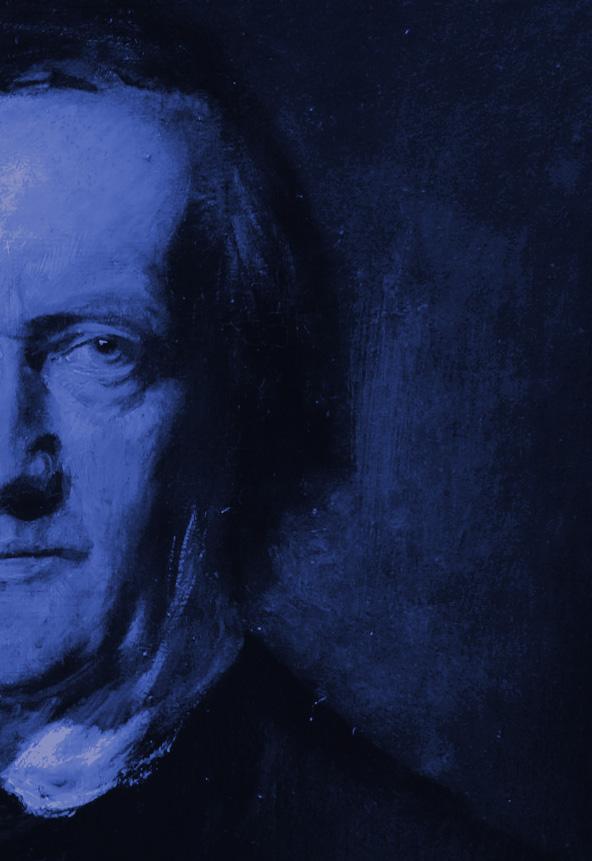
For Wagner, the theatre was serious business. He lambasted his contemporaries for treating opera as mere entertainment, with frivolous plots, mediocre libretti, formulaic structures, and gratuitous virtuosic displays. Instead, Wagner envisioned an organic artform that harkened back to the ideals of ancient Greek drama, integrating poetry, drama, stagecraft, music, song, and dance. His desire for a unified artistic vision led him to take the extraordinary decision to write his own libretto (the opera’s text) and detailed stage directions for all his operas. For Wagner, poetry, music, and stagecraft could not be arbitrarily combined — they had to be carefully synthesised. He demanded serious, undivided attentiveness from his audience too. He was the first to darken the lights in a concert to create a heightened, hyper-focused theatrical experience.
In his 1851 essay, A Communication to My Friends, Wagner denounced the prevailing operatic styles of time and set forth his own vision for opera, declaring, “I shall never write an Opera more. As I have no wish to invent an arbitrary title for my works, I will call them Dramas….” In that same essay, he also announced his next project: “I propose to produce my myth in three complete dramas, preceded by a lengthy Prelude....” This “myth” was none other than the monumental cycle Der Ring des Nibelungen (The Ring of the Nibelung).

Wagner’s public announcement of the Ring cycle in 1851 might suggest that it was near completion, but in fact he had scarcely begun. It would take him another twenty-three years to finish the cycle, a process replete with changes to names, titles, and plot points — the entire ending was reworked thrice!
Wagner had begun sketching his cycle as a single opera, Siegfrieds Tod, which recounted the mighty exploits and tragic death of the legendary hero Siegfried. This would eventually morph into the last opera in the cycle, Götterdämmerung. The source material for Wagner’s tale consisted of legendary Norse sagas, including the Icelandic Eddas and Völsungasaga, the Norwegian Thidrekssaga, and the Nibelungenlied, an epic poem nicknamed “the German Iliad”. During Wagner’s lifetime, there was a rising sense of nationalistic zeal in German-speaking lands to unite as one people. Wagner’s audiences would have recognised the stories from the Nibelungenlied as their shared cultural heritage. Ultimately, Wagner’s goal was to build a galvanising “national myth” for a unified German country that was yet to come.
After Wagner’s death, the sweeping soundscapes and lofty ambitions of his operas were taken down some dark paths in the 20th century. His music (together with Mozart’s and Bruckner’s) was widely appropriated as Nazi propaganda, and this was not helped by the fact that Wagner left behind several antisemitic writings. We should note that, importantly, Wagner was never a Nazi — the party was only founded decades after his death — and there is no evidence that the Nazis referred to or were even aware of his writings (which some argue were products of his time). Nevertheless, associations between Wagner and Nazism have strengthened over the course of the 20th century. As Alex Ross writes, “in an unsettling way, we now listen to Wagner through Hitler’s ears. I doubt that anyone would have been more confounded by this turn of events than Theodor Herzl, the founder of Zionism, who was deeply under Wagner’s spell.” It is important to look at these associations critically and think about whether such assumptions are indeed valid ones to hold today.
By 1850, Wagner had completed the libretto and musical sketches for Siegfrieds Tod, but it was deemed insufficient — a preliminary opera, Der junge Siegfried (later renamed Siegfried), was needed for greater context. However, once this libretto was finished, Wagner’s creative ambition was not satisfied. For the “conveyance of [his] comprehensive purpose”, two more operas were necessary, forming a cycle of four operas in total. By the end of 1852, he would complete the verse drafts of Die Walküre and Das Rheingold.

Once the structure of the cycle — “three dramas, with a lengthy prelude” — was defined, it would stay consistent throughout the rest of the writing and composition process. Interestingly, Wagner never called the Ring cycle a tetralogy; instead, he always referred to it as a trilogy with a prelude (or prequel in today’s common parlance).
Within this superstructure, Wagner applied the same structural ideas to the opening and closing operas. Das Rheingold and Götterdämmerung can be seen to each have the same prelude and trilogy structure as the Ring itself. In Das Rheingold, the first scene is separated in time from the remaining three, which happen consecutively one after another.
Wagner wrote his libretto in reverse order, beginning with Siegfried’s death in the final opera and working backwards, but he would compose the music chronologically. Beginning with Das Rheingold, he worked on the cycle intermittently, even pausing for over a decade to focus on other operas. Wagner eventually finished the music for the fourth and final opera, Götterdämmerung, in 1874. At long last, the cycle was complete.
In order to create a coherent narrative across four operas, Wagner had to engage in world-building and mythmaking. These processes are common in other genres, such as high fantasy and science fiction novels and graphic novels. Modern day films are also particularly adept at it, from The Lord of the Rings and Star Wars, to Dune and the sprawling Marvel Cinematic Universe. But for Wagner, the sheer scope of his creative vision was extraordinary for his time, casting a grand design over the four massive operas, freely cross-referencing plot details and thematic ideas over more than fifteen hours of music.
By writing his own libretti, Wagner had much greater control over the intricate links between text and music. The philosopher Bryan Magee provided the following illustration – if the line is “Love gives delight to the living”, Wagner will stay in the same key throughout as these are compatible concepts. If the line is “Love brings delight and sorrow”, Wagner will change the key midway, teasing out the contrasting aspects of delight, and sorrow in his music. To do this, Magee writes that Wagner creates a “symphonic web of infinite plasticity”.
When writing the music, Wagner utilised “reminiscence motifs”, themes which had already been played before, which the audience would create an association with, and remember, when they recurred later. He also utilised “presentiment motifs”, themes presented in whole or part, which prepare and foreshadow something that is to come.
Years later, the scholar Hans von Wolzogen created a new overarching term, the “leitmotif”, directly translated as leading motif, or “theme”, to encapsulate the reminiscence motif and presentiment motifs more broadly. Today, there are many online resources which catalogue and analyse the hundreds of leitmotifs in Wagner’s Ring This technique provided many of today’s film music masters such as John Williams and Howard Shore, with a toolbox to engineer dramatic and emotional impact in their film scores.
These leitmotifs are not static unchanging objects, but are continuously developed and transformed, imbuing them with different meanings. Throughout the four operas, the leitmotif for Valhalla is often used to allude to Wotan himself. Initially in Das Rheingold, it is presented in a major key, clothed in the grandeur of a brass chorale. In this form it represents the splendour of the realm of the gods with forthright assurance. But as Wotan’s troubles deepen, the leitmotif transforms into a minor key, imbuing it with despair and anguish.
Wagner imbued the leitmotif with incredible flexibility and facility, so these themes could not only provide reminiscences and presentiments, but also show linkages between characters and dramatic events. Strategically placed leitmotifs allow the orchestra to take the function of the ancient Greek chorus, commenting on events, speaking directly to the audience, and also suggesting links and contrasts between events.
For example, in Das Rheingold, Freia is described as the goddess of youth and love. Out of Freia’s leitmotif, Wagner develops an entire family of themes related to love. This musical connection between the person of Freia and the concept of love reveals an interesting parallel: by offering Freia as wages for having Valhalla built, Wotan is, like Alberich, renouncing love for power.
Wagner’s meticulous integration of vivid orchestration, harmonic language, and leitmotifs with his narratives tightened the dramatic structure of his operas. Deryck Cooke described this web of ideas as a “unified symphonic fabric, built up by development, fragmentation, variation and transformation”.
In many ways, Das Rheingold exemplifies Wagner’s remarkable concept of a “total work of art”. His masterful synthesis of music, poetry, and stagecraft is on stunning display right from the opening bars. This iconic opening scene is a musical painting of the birth of creation and nature in its primordial state. A single E-flat major chord emerges from the depths of the orchestra, unfolding inexorably into a luminous sonic flood. When the Rhinemaidens appear, their innocence is represented by their initially unintelligible, joyous vocalisations, before intelligible words appear. The commentator Dieter Borchmeyer remarked, “not only do we see the origins of the world, we also witness the birth of language”. These Rhinemaidens exist in a state of fragile naïveté, unable to appreciate the seriousness of their task to guard the Rhinegold. When Alberich appears, his interactions with the Rhinemaidens taint the music with darkness and dissonance. He subsequently steals the Rhinegold by renouncing love in exchange for dominion over nature, and destroys this harmonious state, precipitating the chain of corrupt, calamitous actions that launch this epic drama.
This is but a brief taste of the intricate myth and world which Wagner created in the Ring cycle. It can be an incredibly rewarding experience to delve deeply into its themes and ideas. Wagner's drama illuminates the many facets of the human condition with wit, clarity and compassion, resulting in its enduring recognition as one of the greatest artistic achievements of all time.

THE RHINEMAIDENS
Woglinde Wellgunde Floßhilde
THE GODS
Wotan RULER OF THE GODS
Fricka GODDESS OF MARRIAGE, WOTAN’S WIFE
Loge DEMIGOD OF FIRE
Freia GODDESS OF YOUTH AND LOVE
Donner GOD OF THUNDER
Froh GOD OF SPRING
Erda GODDESS OF THE EARTH
THE NIBELUNGS
Alberich RULER OF THE NIBELUNGS
Mime ALBERICH’S BROTHER
In the beginning, the World-Ash-Tree stood at the base of the world, and in its shade bubbled the spring of wisdom. The young god Wotan, eager for its wisdom, came to the spring. In exchange for a drink of its water, Wotan plucked one of his eyes from its socket — such was the price of wisdom.
With his other eye, Wotan looked around the spring, and his gaze fell upon the boughs of the World-Ash. Thirsting for power, Wotan ripped a branch from the tree and fashioned himself a spear. Alas, the WorldAsh, wounded by his crime, withered away, and the spring of wisdom ran dry — such was the price of power.
Wotan carved his many treaties into the spear’s shaft, gaining power through the rule of law. With the same spear he tamed Loge, the fickle demigod of fire, who would serve as his counsellor.
Years passed, and the gods desired a fortress for themselves. Wotan ordered two giants, Fasolt and Fafner, to build it for them. Cunning Loge suggested the goddess of youth and love, Freia, as payment. In his greed, Wotan forfeited the goddess — such was the price of his fortress.
In time, Wotan saw his folly, but would not halt the fortress’s construction. Instead he urged Loge to find some other way to pay the giants.
Elsewhere, three Rhinemaidens, Woglinde, Floßhilde, and Wellgunde, stand watch through day and night. They have an onerous task — to guard the precious Rhinegold, hidden deep in the river Rhine. It is here that our story begins…
THE GIANTS
Fasolt Fafner

A slow rising arpeggio, first played by the horns. Initially it seems to represent just the river itself, but eventually the meaning broadens to encompass the whole of nature and creation.

A bright fanfare, first played by the horn, announcing the appearance of the gold. This will reappear in various forms, including some menacing, minor key versions that signify the distortion of the gold.

1
The three Rhinemaidens laugh and play as they swim, carelessly guarding the gold. Their frolicking attracts the attention of Alberich, who professes his love (or lust) for them. Mocking his appearance, the Rhinemaidens tease him, as he tries in vain to catch them.
His frustration is interrupted by a beam of sunlight, which illuminates the Rhinegold,2 filling the Rhinemaidens with joy.3 They explain to Alberich that whoever renounces love may take the gold and forge it into a ring4 of absolute power. To their shock and horror, the spurned Alberich curses love and steals the Rhinegold.
First sung ecstatically by the Rhinemaidens: “Rheingold! Rheingold!”, this leitmotif is characterised by a simple step down. Throughout the opera, it will be transformed into a more painful, sighing motif — the joy of the Rhinegold has morphed into the woe of the ring.

Woodwinds introduce this leitmotif, which forms a dissonant, unstable chord, representing the ominous power of the ring.


As Wotan and Fricka awaken from their slumber, their newly completed fortress5 gleams in the distance. Wotan is pleased, but Fricka is deeply distressed; she reminds him that the fortress’s completion means they have to give Freia to the giants as payment. At that moment, Freia rushes to them, pursued by the giants.6 Donner and Froh arrive, and try to hold the giants off while they wait anxiously for Loge to come.

When he finally appears, Loge7 recounts8 how Alberich has forged the ring of power and used it to amass a hoard of gold and treasure, suggesting it as a suitable payment for the giants. The giants agree, but insist on taking Freia ransom until the gods can bring the hoard and ring to them. With Freia gone, the gods begin to age, and Wotan and Loge hurry off to steal it.

In the interlude after Scene 1, the orchestra reprises many leitmotifs from before. Importantly, the ring leitmotif is repeated several times. The harmony and orchestration change with each repetition, eventually transforming it into the grand Valhalla leitmotif, played by the full brass section.
This transformation reveals an underlying similarity between the ring and Valhalla — although they seem to be on opposite sides of good and evil, both objects symbolise power and authority.
This leitmotif, played by low brass, strings, and timpani, suggests the brutish stomping of the giants.


Sprightly, whirling, and highly chromatic, this music represents the demigod himself. However, the meaning is later broadened to signify fire in general.
As Loge recounts the events of Scene 1, listen as the orchestra brings us through the music of Scene 1 as well. Transformed versions of the Rhinemaidens’ song and the gold leitmotif make appearances, and when Loge speaks of the ring we can hear the ring leitmotif as well.
With the power of the ring, Alberich has become an overlord, enslaving the Nibelungs, including his own brother Mime. Under his orders, Mime has forged the Tarnhelm10 — a magical helmet that allows its wearer to change into any shape or form. After Alberich seizes the Tarnhelm, he uses it to cruelly attack Mime and terrorise the other Nibelungs.
Wotan and Loge arrive in Nibelheim, where they meet Mime and Alberich. Alberich boasts of his newfound wealth and power, and suggests that he may one day conquer the rest of the world. Loge goads him into demonstrating the Tarnhelm’s powers, which he does, first turning into a fearsome dragon, and then a small toad. The gods pounce on him just before he turns back into his real self, and drag the captive Alberich out of Nibelheim.
As Wotan and Loge descend into Nibelheim, we hear fragments of Loge’s leitmotif, before a menacing version of the gold leitmotif ushers in the Nibelung leitmotif: a driving, rhythmic pattern:



First played by the orchestra, then literally hammered out on anvils, it evokes the sound of smithing and mining, and later represents the labour and slavery of the Nibelungs.
Set design of Nibelheim, home of the Nibelungs by Josef Hoffmann (CC BY 2.0)
Wotan and Loge force Alberich to hand over his hoard, including the Tarnhelm. Alberich grudgingly agrees, reasoning that he can still regain his riches since he has the ring. But before they let him go, Wotan demands the ring itself, and forcefully takes it from Alberich’s hand. Now free but utterly powerless, Alberich is devastated. In his fury, he curses11 the ring: ceaseless worry and death shall plague its bearer, until it is returned to him.
Wotan and Loge are welcomed back by the gods, and the giants return with Freia in tow. Fasolt is not convinced that the hoard is valuable enough, and demands that they pile it up12 until it completely hides her from his view. Despite heaping all the gold (and even the Tarnhelm), it is not enough — Fasolt can still see Freia’s eye through a small gap. Fafner asks Wotan to add the ring to the pile, but he refuses, and the giants prepare to carry Freia away.
Suddenly, Erda,13 the ancient goddess of the earth, appears, and warns Wotan that clutching to the ring will bring about the end of the gods.14 Wotan is frightened and intrigued, but before he can learn more, she vanishes. Heeding her advice, he throws the ring onto the hoard, ransoming Freia. With the hoard in their hands, the giants begin to bicker over who should keep the ring, and Fafner slays Fasolt. Thus Alberich’s curse claims its first victim.
As Fafner leaves with the hoard, Donner15 clears the mists away with a storm, and Froh creates a rainbow bridge to the fortress, which Wotan christens “Valhalla”. As the gods enter their new home, a wailing cry16 is heard in the distance. In the valley, the Rhinemaidens are lamenting the loss of the Rhinegold, but the gods brush them off coldly. Only Loge is aware of the gods’ arrogance, and sceptical of the supposed peace.
11.
First heard when Alberich declares his curse on the ring, the next important time we hear it is when Fasolt is struck down by his brother — the curse in action.
12. piling up the gold
As the gods begin to pile up the gold, we can hear the Nibelung leitmotif again (amongst many others). The meaning here is twofold: first, it reminds us that this hoard was made by the Nibelungs; second, it also represents the physical labour of piling up the gold.
13. Erda leitmotif

A mysterious, minor key version of the Nature leitmotif, revealing Erda’s deep connection to Earth and the natural world.
14. Twilight of the Gods
A descending version of the Nature leitmotif; where the latter depicts creation and the beginning, this leitmotif depicts destruction and the end.

15. thunder leitmotif

First sung by Donner to the words “Heda! Heda! Hedo!”, this powerful leitmotif will reappear in Die Walküre, as part of the storm in its opening.

The Rhinemaidens’ song from Scene 1 reappears, this time muted and accompanied by a lonely harp. As they mock the gods, it morphs into the minor key, before their cries are swept away by the Valhalla leitmotif.
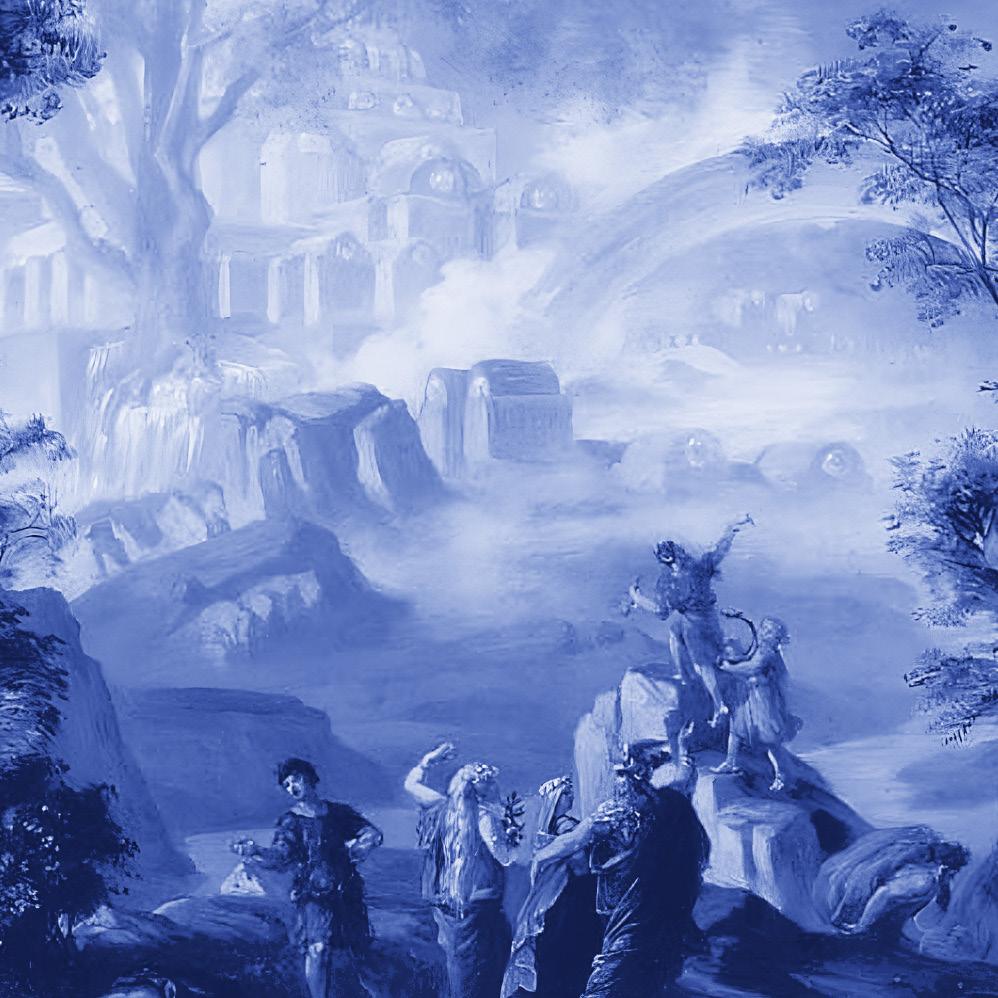

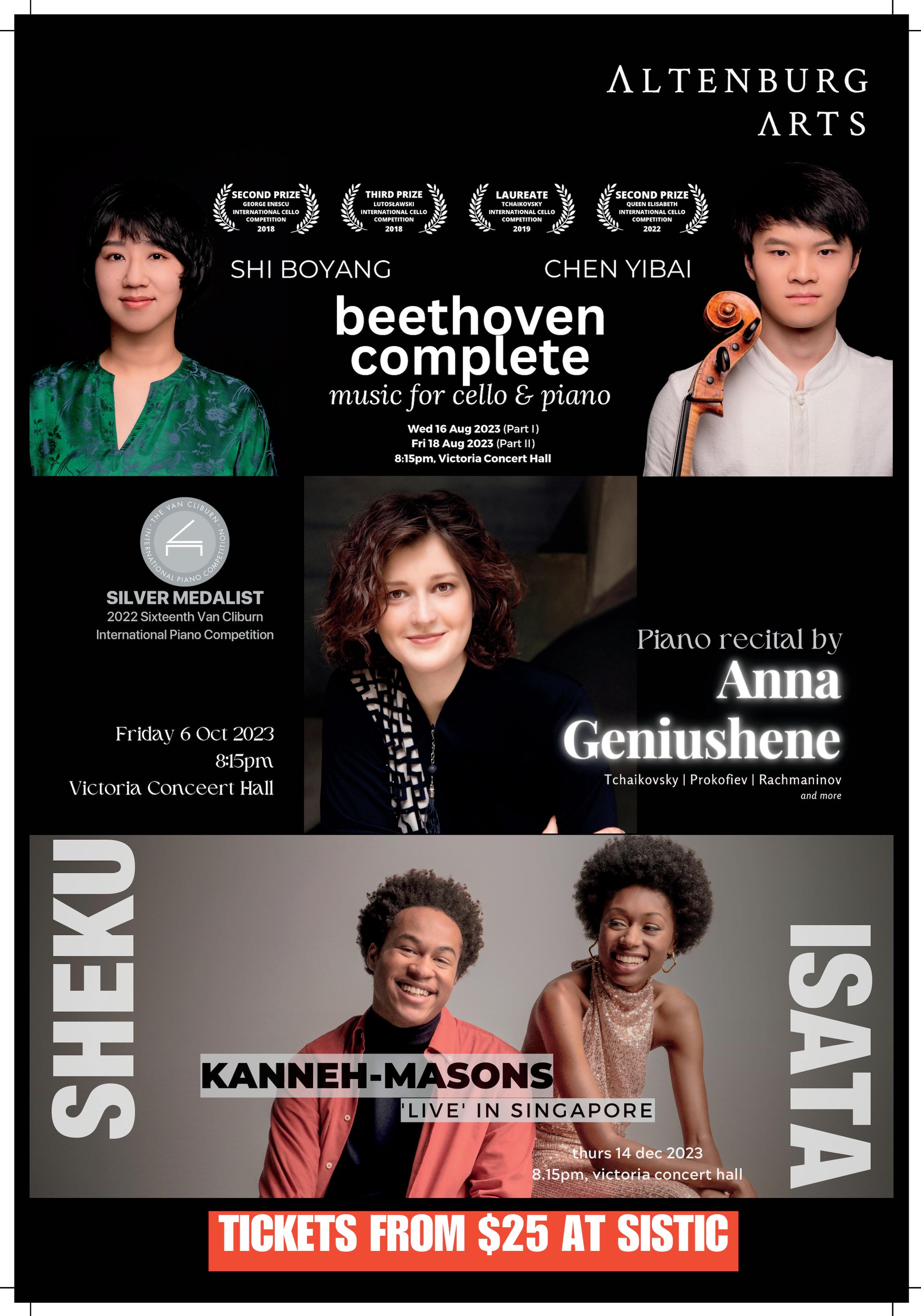

A graduate of The Juilliard School and the Eastman School of Music (High Distinction), Joshua Kangming Tan was 2nd Prize winner of the Dimitri Mitropoulos International Competition, and an awardee of numerous scholarships and awards. For an unprecedented two years running, his performances of Bernstein’s Mass and the opera Don Pasquale were selected as the best classical concert of the year 2018 and 2019 by the Straits Times. Presently Principal Conductor of the Singapore National Youth Orchestra and Director of the Asia Virtuosi, he has served successful stints as Resident Conductor of the National Centre for the Performing Arts (NCPA) Beijing Orchestra, Principal Conductor of the Guiyang Symphony Orchestra and Associate Conductor of the SIngapore Symphony Orchestra.
Highlights of his 22/23 season include debuts with the Melbourne, New Zealand and Manila Symphony Orchestras, Hong Kong Sinfonietta, Taipei Philharmonic Orchestra, a new opera premiere in Hong Kong, return engagements to Hong Kong Philharmonic, Evergreen Symphony, the operas Die Fledermaus, Pagliacci and Cavalleria Rusticana, and with the Singapore Ballet, The Nutcracker and Cinderella Das Rheingold is Joshua’s 6th appearance with OMM. Previous highlights include the Singapore Premiere of Bernstein’s Mass (2018) and Rachmaninoff’s Second Symphony (2022).
Tang Xinxin is a renowned opera director, who graduated from the National School of Music and Drama in Hamburg, Germany. She worked as resident director at the National Centre for the Performing Arts (NCPA) Beijing from 2011 to 2015. At the NCPA, she directed a number of operas such as Tosca, L’elisir d’amore, Il trovatore, Nabucco, Un ballo in maschera, Otello, Il barbiere di Siviglia, La Cenerentola, L’italiana in Algeria, Der fliegende Holländer, Lohengrin, Der Rosenkavalier, Cavalleria Rusticana, Pagliacci, Les Contes d’Hoffmann, and Carmen, among others.
Tang Xinxin has since moved to Singapore and has directed Donizetti’s Don Pasquale for the Arts Place which was nominated by the Singapore media as one of the best classical music events of 2019. Subsequently, she directed Don Giovanni and Così fan tutte for the Singapore Lyric Opera, Menotti’s The Telephone and Puccini’s La Boheme for the Musicians’ Initiative in 2021.
She also directed dramatic representations of Zemlinsky’s Sechs Lieder auf Gedichte von Maeterlinck and Mahler’s Lieder eines fahrenden Gesellen with the Wayfarer Sinfonietta. In 2022, she directed the Singapore premiere of Rossini’s opera L’inganno felice for Lirica Arts at the NAFA Lee Foundation Theatre as well as Johann Strauss’s Die Fledermaus for the Singapore Lyric Opera. And in 2023, she made her American directorial debut with Opera Southwest, in Puccini’s Turandot


Mirabel Neo is a Production and Stage Manager based in Singapore. She has over a decade of experience managing productions across various genres, such as drama, musical theatre, classical opera and theatre for the young, as well as commercial events. She has stage managed many productions including The Disappearing Number, ChildAid, HomeTeamNS, and Richard Wagner’s The Flying Dutchman. She has also served as Production Manager for The Nutcracker – Chinese Version (2019) and Theater for the Young (2018).
This is her 4th collaboration with the Orchestra of the Music Makers, with Hansel and Gretel (2017), Bernstein’s Mass (2018), and the Singapore Premiere of Die Walküre (2020) as particular highlights.
Tan Wei Ting was first trained in theatre and later went to film school. Her debut short film “CA$H” was selected for International Competition at the 41st Clermont-Ferrand International Short Film Festival in France. The film also won Best Directing in the Open Category at the National Youth Film Awards 2018, and went on to travel to 20 different countries. Her latest short film “Love at Fifty” was in competition at the 33rd Singapore International Film Festival, and crossed half a million views on Our Grandfather Story. She was from the pioneer batch of ARTivate — youth wing of Drama Box.


Wee started out as a lighting technician before venturing into lighting and multimedia programming/ design and eventually co-starting Ctrl Fre@k in 2010. His lighting programming credits include Robert Wilson’s In The Evening at Koi Pond at Aichi World Expo (2005), The Life and Death of Marina Abramovic at Manchester International Festival (2011), Via Crucis at Weimar Arts Festival (2012) and Adam’s Passion (Eesti Konsert), Voyage De La Vie (The Generating Company), National Day Parade (NDP) 2005, 2009 and 2022.
He designed the lights for Korean Pop Night Concert 2010, Imagine – A Soundtrack of Peace music concert and Praying Mantis by Vision Of The Dance from Spain, and was the associate lighting designer for NDP 2022. Additionally, Wee was the Multimedia Technical Manager for NDP 2014, and did the Show Control, Lighting and Multimedia system design for the Singapore Bicentennial Experience
Yo Shao Ann received a Master of Fine Arts in Theatre from the University of California, San Diego. He was the 2006 recipient of the Young Artist Award for technical theatre from the National Arts Council. He is presently a senior lecturer with the School of Technology for the Arts at Republic Polytechnic.
Das Rheingold is his 6th collaboration with the Orchestra of the Music Makers. Previous designs include Engelbert Humperdinck’s Hansel and Gretel (2017), Leonard Bernstein’s Mass (2018), and Richard Wagner’s Die Walküre (2020).


Singaporean soprano Teng Xiang Ting read law at the National University of Singapore and qualified as a lawyer before beginning full-time studies in vocal performance at the Royal Northern College of Music. After graduating with Distinction in her Masters of Music Performance, she was offered a scholarship to sing with the Swiss Opera Studio in Biel for their 2017-2019 season.
Xiang Ting sang her first major role, Adina in L’elisir d’amore, at the age of 23 with New Opera Singapore, and her performance was praised by The Straits Times as being the ‘Best Debut’ of 2012. In 2019, she made her professional debut in Switzerland at the Theatres of Biel and Solothurn performing Belinda and First Witch in Dido and Aeneas. Her voice garnered praise in Das Opernmagazin as having “sparkling charm and youthful spirit.” In the same year, her performance of Norina in Don Pasquale with The Arts Place received special commendation as being “Singapore’s first true opera star”. Other notable roles include Dido (Dido and Aeneas), Mimi (La Bohème), the Governess (Turn of the Screw), Pamina (Die Zauberflöte), Rosalinda (Die Fledermaus), and Eurydice (Orpheus in the Underworld).
This is Xiang Ting’s 2nd appearance with OMM, having previously sung the Klaus Simon orchestration of Mahler’s Fourth Symphony for chamber orchestra (2021).
London-based Singaporean soprano Victoria Songwei Li is a graduate of the Royal Academy of Music in London, and the Guildhall School of Music and Drama, studying with Jennifer Dakin and Yvonne Kenny. Victoria made her operatic debut in 2012 with New Opera Singapore as Giannetta in L'elisir d'amore (Donizetti). Since then, opera roles have included Elle in La Voix Humaine (Poulenc), Tytania in A Midsummer Night’s Dream (Britten), Blanche in Les Dialogue des Carmélites (Poulenc), Poppea in L'incoronazione di Poppea (Monteverdi), Cupidon in Orpheus in the Underworld (Offenbach). For the English National Opera, she has sung the roles of Pepik and Woodpecker in The Cunning Little Vixen (Janá ček), Mrs Delgado in It’s A Wonderful Life (Jake Heggie), and A Handmaid in The Handmaid’s Tale (Poul Ruders).
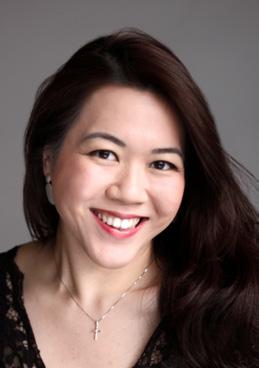
Opera aside, Victoria has also sung as a soloist with the Los Angeles Philharmonic under the baton of Gustavo Dudamel, Southbank Sinfonia, Daegu Opera Orchestra, and the Singapore Symphony Orchestra. She was also the winner of the Opera category in the David Clover Festival of Singing (UK) and the recipient of the Cyril Greaves Bursary. In 2019, she was awarded First Prize and the Osaka Governor Award at the 20th International Osaka Music Competition (Japan).
British mezzo Anna Harvey is the winner of the First Prize (Prix Pierre Verne) in the 2022 Paris Opera Competition. This season, she sings the roles of Prinz Orlofsky (Die Fledermaus), Hänsel (Hänsel und Gretel), Meg Page (Falstaff), Suzuki (Madama Butterfly), Second Dame (Die Zauberflöte), and Brigitta (Die Tote Stadt) in a new production at Deutsche Oper am Rhein, where she is a member of the solo ensemble. Other recent roles include Annio (La clemenza di Tito), Varvara (Kát’a Kabanová), Floßhilde (Das Rheingold and Götterdämmerung), Siegrune (Die Walküre), Polina/ Daphnis (Pique Dame), The Child (L’enfant et les sortilèges), Bejlia (Weinberg’s Mazeltov), and Flora (La Traviata).
Concert engagements in the current season include Mozart’s Vesperae solennes de Dominica and Coronation Mass with the Gaechinger Cantorey, Handel’s Messiah at the Royal Festival Hall, Wagner’s Wesendonck Lieder with Orchestre de Picardie, Dvorak’s Mass in D at Winchester Cathedral, and Mahler’s Symphony No. 2 in her hometown of Sheffield.
Anna is a previous Associate Artist at Welsh National Opera, where she returned in 2021 as Suzuki (Madama Butterfly) and 2020 as Cherubino (Le nozze di Figaro). Other roles include Goffredo (Rinaldo) at Theater Chemnitz and Hippolyta (A Midsummer Night's Dream) with the Britten Sinfonia at Nevill Holt.

German baritone Joachim Goltz is a permanent member of the ensemble of Nationaltheater Mannheim, where he performs numerous roles especially of the “dramatic helden-fach” and “charakter-baritone-fach”.
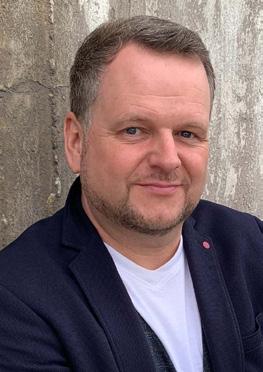
His much celebrated debuts there as Beckmesser (Die Meistersinger von Nürnberg), Golaud (Pelleas et Melisande), as well as Jakob Lenz in the opera of the same name by W. Rihm (staging: Calixto Bieito) highlight his versatility - as do Papageno (Die Zauberflöte), Faninal (Der Rosenkavalier) and Fra Melitone (Forza del Destino).
Internationally, Goltz can mostly be seen and heard in the great baritone roles by Wagner, which recently led him to Prague (title role in Der fliegende Holländer), Madrid’s Teatro Real (Gunther in Götterdämmerung) and the Daegu Opera Festival in Korea (Alberich in Der Ring), to name a few. In 2023 Goltz will make his house debuts in Cologne (title role in Der fliegende Holländer), Nuremberg (Telramund in Lohengrin) and Düsseldorf (Klingsor in Parsifal).
He has worked with conductors such as Christian Thielemann, Stefan Soltesz, Andrés Orozco-Estrada, François-Xaver Roth, Gabriel Feltz, Cornelius Meister, Alexander Soddy, Axel Kober and Pablo HerasCasado. In addition to the great opera roles of his fach, operetta is his big passion; be it as Graf Danilo (Die lustige Witwe), as Eisenstein (Die Fledermaus) or as Leopold in Ralf Benatzky’s Im weißen Rößl
Caitlin Hulcup has appeared at leading opera houses internationally, including the Wiener Staatsoper, Berliner Staatsoper, Royal Opera House Covent Garden, Bayerische Staatsoper Munich, Teatro Real Madrid, Maggio Musicale Fiorentino, Théâtre des Champs Elysées, La Monnaie, Theater an der Wien, Bolshoi Theatre and Palau de les Arts Valencia.
In 22/23, she performs the role of Orfeo in Gluck’s Orfeo ed Eurydice with the Chelsea Opera Group, Mahler’s Symphony No. 2 at the Musikverein Wien, Handel’s Messiah with the Royal Northern Sinfonia, Mahler’s Kindertotenlieder with the Noord Nederlands Orkest, with whom she previously performed Das Lied von der Erde, and the role of Fricka (Das Rheingold) in Singapore, where she previously performed the same role in Die Walküre.

Recent performances include a return to Opera Lafayette for Purcell’s Mad and Spiritual Songs, a recital for the Oxford Lieder Festival alongside violinist Jonathan Stone and pianist Sholto Kynoch, the title role in The Rape of Lucretia with Potsdam Winteroper, Handel’s Messiah with Kammerorchester Basel, the Verdi Requiem at the Adelaide Festival and also in Amsterdam, Penelope (The Return of Ulysses) for The Royal Opera in London, and Piacere (Il Trionfo del Tempo e del Disinganno) at the Royal Danish Opera.
This would be Caitlin’s 4th appearance with OMM, having previously sung the role of Hansel in Hansel and Gretel (2017), alto soloist in Mahler’s Second Symphony (2018), and Fricka in Die Walküre (2020).
Greer Grimsley is internationally recognized as an outstanding singing actor and one of the most prominent Wagnerian singers of our day. Grimsely’s reign as a leading interpreter of the god Wotan has brought him to myriad esteemed international opera houses; some highlights of this include his portrayal of the role in the entirety of Der Ring des Nibelungen with Deutsche Oper Berlin, Teatro Comunale di Bologna, Gran Teatre del Liceu in Barcelona, New National Theatre Tokyo, the Nikikai Opera Foundation in Tokyo, San Francisco Opera, the Royal Opera Stockholm, and for Seattle Opera in 3 complete cycles over the past decade.
This season’s engagements include returns to Seattle Opera as the High Priest in Samson et Dalila and Wotan in Das Rheingold, the latter of which he will also perform with both the Atlanta Opera and the Orchestra of the Music Makers in Singapore. In addition, Grimsley will perform Scarpia in Tosca with San Diego Opera. Next season, Grimsley returns to The Metropolitan Opera as The Captain in Mary Zimmerman’s new production of Florencia en el Amazonas, Atlanta Opera as Wotan in Das Rheingold, the Royal Swedish Opera as Gurnemanz in Parsifal, and Santa Fe Opera in the world premiere of The Righteous
Australian soprano Anita Watson is a graduate of the Jette Parker Young Artist Programme at the Royal Opera House, Covent Garden. Her engagements have included Micaëla (Carmen), Pamina (Die Zauberflöte) and Countess Almaviva (Le Nozze di Figaro) for Welsh National Opera; The Governess (The Turn of the Screw) for English National Opera, at Teatro La Fenice, Venice, and Théâtre du Capitole, Toulouse; Donna Anna (Don Giovanni) for Opera Australia, West Australian Opera, Scottish Opera, Nederlandse Reisopera and Landestheater Salzburg; Mimì (La bohème) for Opera North and Nederlandse Reisopera; Fifth Maid (Elektra) at Salzburg Festival; and Anne Trulove (The Rake’s Progress) at Teatro Municipal de Santiago. For The Royal Ballet, she was Soprano Soloist for Wayne McGregor’s Morgen. Anita Watson has appeared worldwide in concerts, recitals and television and radio broadcasts, highlights including Beethoven’s Symphony No. 9 with Accademia di Santa Cecilia, Roma, and Melbourne Symphony Orchestra and Richard Strauss’s Four Last Songs with Rheinische Philharmonie, Koblenz, and Mariinksy Orchestra, St Petersburg. Her recordings include Hänsel und Gretel and Dido and Aeneas, both available on Opus Arte DVD/Blu Ray, Ariadne auf Naxos for Chandos on CD, Parsifal for Hallé on CD and Fata Morgana — Songs by Pavel Haas for Resonus Classics.
The bass Yorck Felix Speer obtained his singing education under Hanna Schwarz, Brigitte Fassbaender, and Andreas Schmidt. Speer studied German and theology and, since 1996, works as a freelance concert singer.

Many engagements led him to renowned houses and festivals where he had the opportunity to work with conductors such as Ivor Bolton, Marc Minkowski, Thomas Hengelbrock, Roger Norrington, Semyon Bychkov, Francois-Xavier Roth, Enoch zu Guttenberg, Philippe Herreweghe, Marek Janowski, Trevor Pinnock and Kristjan Järvi.
He made his operatic debut as Sarastro in The Magic Flute followed by engagements at Opera Cologne in Schreker’s Die Gezeichneten and Tannhäuser, Marke (Tristan und Isolde) and Daland (The Flying Dutchman) in the Netherlands/Reisopera, Hunding (Die Walküre) in the RING production in Kassel, and Daland at the Teatro Petruzzelli in Italy.

In 22/23 he returned to the Zurich Opera House as Bartolo in Le nozze di Figaro under Stefano Montanari/Jan Philipp Gloger and to Theater St. Gallen as Sarastro, followed by many concerts of Verdi’s Requiem and an important role debut of Rocco in Beethoven’s Fidelio. In the upcoming season he will start to be a permanent member at the renowned Leipzig Opera.

Lukasz Konieczny was born in Lodz, Poland and studied singing at the Music Academy in Wroclaw. Master classes with renowned singers and pedagogues such as Prof. Christian Elsner, Deborah Polaski, Franz Grundheber, Linda Watson, David Syrus as well as acting courses at the International Film School Cologne completed his education.
His repertoire includes the Mozart parts of Bartolo (Le nozze di Figaro), Masetto, Il Commendatore (Don Giovanni), and Sarastro (Die Zauberflöte), as well as roles like Rocco (Beethoven’s Fidelio), Sparafucile (Verdi’s Rigoletto), Banco (Verdi’s Macbeth), Fafner (Wagner’s Rheingold and Siegfried) and Hunding (Wagner’s Walküre). Konieczny's concert repertoire includes Beethoven‘s 9th Symphony, Mozart‘s Requiem und Coronation Mass, Dvorak‘s Requiem, Mendelssohn‘s Paulus or Penderecki‘s Polish Requiem From 2011-2019 he was a member of the ensemble at the Deutsche Oper am Rhein in Düsseldorf. Guest appearances have taken him to the Handel Festival in Halle as Polifemo in Acis and Galatea, to the Mainfrankentheater Würzburg as Rocco, to the Hamburg State Opera as Sparafucile. Further guest engagements led him to the Bavarian State Opera, Semperoper Dresden, Müpa Budapest, Maggio Musicale Florence, National Opera Warsaw and the Baltic Opera in Gdansk.

Austrian tenor Florian Thomas pursued law and musicology before studying voice. He is now a soloist in oratorio, concert and operatic repertoire, regularly giving Lieder recitals in Europe and the UK. Upcoming concerts include Mahler's Das Lied von der Erde in Australia. Florian performed the role of Walther von Stolzing in Wagner’s Die Meistersinger von Nürnberg for Fulham Opera under Ben Woodward. He has also appeared as Erik in Wagner’s Der fliegende Holländer under Anthony Negus, jumping in at short notice for Longborough Festival Opera. He has sung Don José in Bizet’s Carmen at the Dartington Festival under conductor David Angus and as tenor soloist with the Bournemouth Symphony Orchestra in Richard Blackford’s cantata Voices of Exile conducted by Gavin Carr. Florian performed Schubert’s Lieder cycle Die Winterreise in Oxford with the acclaimed Argentine pianist Alberto Portugheis.
Prior to launching his solo career Florian gained extensive experience on the operatic stage at the highest professional level. While living in Vienna he appeared at the Vienna State Opera as a member of the chorus and also performed minor roles, at the Salzburg Festival and in numerous international tours with the Wiener Staatsopernchor and the Konzertvereinigung Wiener Staatsopernchor. Florian additionally served as member of the Hofmusikkapelle Wien during this time, regularly singing as a soloist in oratorios and masses in major venues; Musikverein Wien, Konzerthaus Wien, Stephansdom Wien among them.
Praised for a voice of "deliciously deep and rich," (Birmingham Post), Hong Kong baritone Michael Chun Ting Lam was awarded the Gil Rodriguez Scholarship by Opéra de Baugé for his outstanding contribution to their Operatic Season in 2019. He studied music at the Hong Kong Academy for Performing Arts, Royal Birmingham Conservatoire and Liszt Ferenc Academy of Music in Hungary. He was the first prize winner in many international singing competitions and the recipient of numerous awards and scholarships, including the St Clare Barfield Memorial Bowl for Operatic Distinction, Opera Hong Kong K Wah International Vocal Scholarship and the Bernard van Zuiden Music Fund, etc.
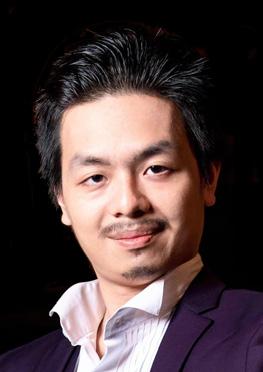
A wide-ranging opera and concert soloist, Michael has performed in Hong Kong, the United Kingdom, Italy, France, Germany, as well as other European countries. Passionate about opera, he has sung over 40 operatic roles including the title roles of Macbeth, Don Pasquale, Giulio Cesare and Il barbiere di Siviglia, Tonio (Pagliacci), Alfio (Cavalleria Rusticana), Count Almaviva (Le nozze di Figaro), Marcello (La Bohème), Escamillo (Carmen), Belcore (L'elisir d'amore), Il Commendatore (Don Giovanni), and Forester (The Cunning Little Vixen), among others. Recently, he made his debut at the Hanoi Opera House, in Vietnam, and in the Golden Hall of the Musikverein, Vienna.
Finnish tenor Tuomas Katajala studied in Helsinki, Rome and Amsterdam. Before advancing to an opera career, he was already a well-known concert and oratorio soloist and a Lied recitalist. Highlights on the opera stage in recent seasons were Tamino (The Magic Flute) at Covent Garden in London, at Berlin’s State Opera, Opéra de Lille and in Tampere, Count Almaviva (Il barbiere di Siviglia) at Komische Oper Berlin, as well as Tamino, David (Meistersinger von Nürnberg), Lenski (Eugene Onegin), and Steersman (The Flying Dutchman) at the Finnish National Opera.

In 2019, Katajala made his debut as Max in Der Freischütz, touring venues and festivals throughout Europe. This engagement marked a change in repertoire and was followed by debuts as Loge (Das Rheingold) in Helsinki, Idomeneo in Tel Aviv, Parsifal and Oedipus (Oedipus Rex) in Milan, and Hoffegut in Braunfels’ Die Vögel in Strasbourg.
He has performed Bach, Handel, Beethoven, Bruckner, Mahler and others at venues ranging from Avery Fisher Hall in New York to the Salle Pleyel in Paris and the Glyndebourne Festival. Future projects include debuts as Lohengrin at Savonlinna Opera Festival and as Erik (The Flying Dutchman) in Beijing, as well as a new production of Poulenc’s Dialogues des Carmélites (as Chevalier de la Force) at the Finnish National Opera.

British-Australian tenor Adrian Dwyer has sung in many of the world's greatest opera houses and concert halls, gaining recognition for his extraordinarily wide-ranging vocal ability and vivid theatrical presence in works from the classical era to the present day.
Adrian made his role debuts as Mime (Das Rheingold and Siegfried) in Longborough Festival Opera's new Ring Cycle, adding to appearances in 19th century German repertoire, which have included a new production of Parsifal at Teatro Massimo Palermo, and productions of Salome for Israeli Opera, Opera North and NI Opera. Equally adept in Slavic repertoire, he recently made his debut as Astrologer (The Golden Cockerel) for Theater Magdeburg, sang Anatole (War and Peace) at the Royal Opera House, Covent Garden, and performed in Khovanshchina for Welsh National Opera, where his Andrei was hailed as “career-defining”.
An accomplished interpreter of the most difficult contemporary repertoire, he has also performed D’Esperaudieu in Gerald Barry’s The Intelligence Park at the Royal Opera House (Linbury Theatre), as well as the composer’s Alice in Wonderland for Theater Magdeburg. He is frequently seen as Electrician in Adès’ Powder Her Face, and created the title role in Anthony Bolton's The Life & Death of Alexander Litvinenko at Grange Park Opera.
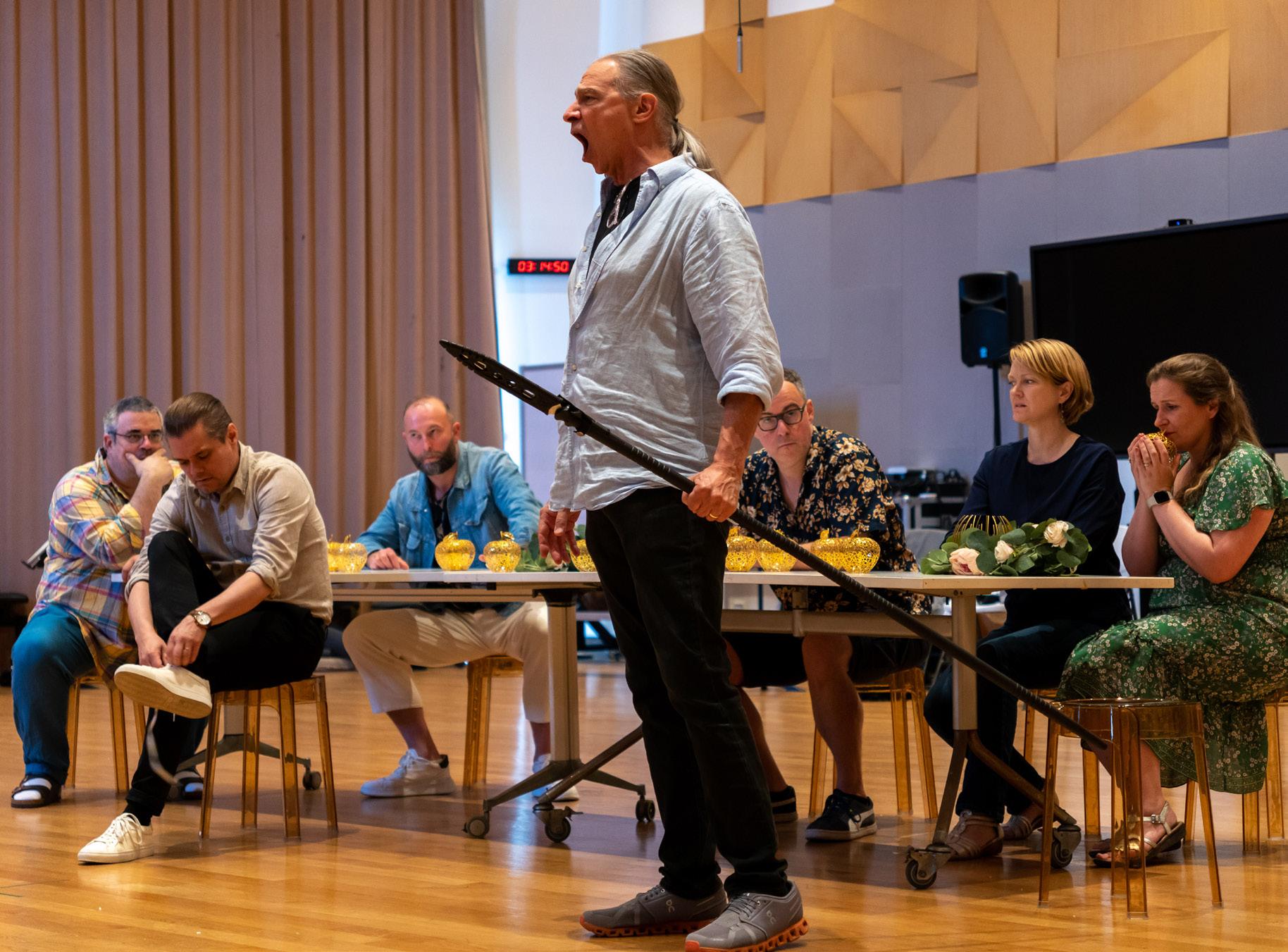
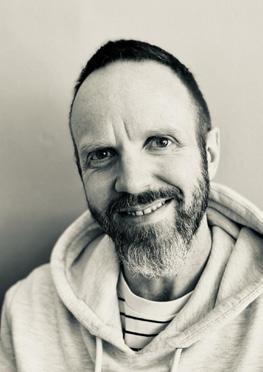
MUSIC DIRECTOR
Chan Tze Law
VIOLINS
Wilford Goh CONCERTMASTER
Chikako Sasaki PRINCIPAL SECOND VIOLIN
Yvonne Lee ASSOCIATE PRINCIPAL
Ang Zien Xu
Nicole Chan
Joelle Chiam
Fong Tze Meng
Jennifer Goh
Nathanael Goh
Emer Hoong
Ashley Hsu
Alexia Huan
Genevieve Koh
Kathleen Koh
Kwan Ze Yu
Esther Lam
Jaslyn Lee
Li Jiaqi
Andre Ng
Estee Ng
Sarah Ng
Edward Tan
Natalie Tan
Joanne Teo
Josiah Teo
Shawn Teo
Gary Teoh
Monica Toh
Yew Shan
Zhang Xiaomeng
Zheng Kai
Christina Zhou
VIOLA
Yeo Jan Wea PRINCIPAL
May Loh ASSOCIATE PRINCIPAL
Shannon Chan
Christopher Cheong
Calvin Dai
Darius Goh
Elizabeth Ip
Leon Lai
Neo Wei Qing
Benedict Ng
Oliver Tan
Toh Xue Qian
Wang Dandan
ASSOCIATE CONDUCTOR
Seow Yibin
CELLO
James Ng PRINCIPAL
Theophilus Tan ASSOCIATE PRINCIPAL
Rachael Chan
Chloe Chen
Choo Vee Shen
Lavinia Chu
Charis Low
Lydia Lu
Edward Neo
Isaac Tah
Tang Ya Yun
Shavaun Toh
DOUBLE BASS
Julian Li PRINCIPAL
Damien Chew
Kenrick Lam
Lee Mian Jun
Lee Zi Xuan
Alvin Liew
Alwyn Loy
Kevin Seah
FLUTE
Cheryl Lim PRINCIPAL
Natasha Lee
Kelsey Tan
PICCOLO
Alvin Chan
OBOE
Tay Kai Tze PRINCIPAL
Chan Chen
Ng Wei Xiang
ENGLISH HORN
Seow Yibin
CLARINET
Vincent Goh PRINCIPAL
Chua Jay Roon
Miao Kaiwen
BASS CLARINET
Daniel Yiau
BASSOON
Lim Tee Heong PRINCIPAL
Shi Jia Ao
Yap Ziqi
FRENCH HORN
Xavier Tan PRINCIPAL
Bryan Chong ASSOCIATE PRINCIPAL
Luke Chong
Harsharon Kaur
Nigel Leong
Lee Yan Liang
Ong Hwee Ling
Jaben Sim
Linnet Sim
WAGNER TUBA
Lee Yan Liang
Nigel Leong
Ong Hwee Ling
Jaben Sim
TRUMPET
Lau Wen Rong PRINCIPAL
Lee Jinjun
Lim Jit Xin
BASS TRUMPET
Vincent Tan
TROMBONE
Don Kow PRINCIPAL
Hendrik Kwek
BASS TROMBONE
Aldwyn Tan
CONTRABASS TROMBONE
Jasper Tan
TUBA
Tan Yao Cong PRINCIPAL
TIMPANI
Yuru Lee PRINCIPAL
Rei Lim
PERCUSSION
Isabel Chin
Putra Syahril
Thanaphat Pratjaroenwanit
HARP
Charity Kiew PRINCIPAL
Charmaine Teo ASSOCIATE PRINCIPAL
Karen Tay ASSOCIATE PRINCIPAL
Madeleine Chong
Christabelle Sheum
Kaitlyn Tan
Lee Guan Wei Daniel CHAIRMAN
Jenny Ang
Assoc. Prof Chan Tze Law
Chay Choong
Christopher Cheong
Susan Loh
Tan Peng Chin
Toh Xue Qian
Prof Bernard Tan ADVISOR
PROGRAMMES DEVELOPMENT CORPORATE SERVICES
ARTISTIC PLANNING
Christopher Cheong HEAD
Nathanael Goh
Michael Huang
Lee Jinjun
Miao Kaiwen
Fredrick Suwandi
Oliver Tan
Isaac Tah
HUMAN RESOURCE
Nathanael Goh
Lee Jinjun
Rei Lim
Estee Ng
Kelsey Tan
Kimberlyn Wu
COMMUNITY ENGAGEMENT
Andre Ng HEAD
Natasha Lee
Benedict Ng
SPONSORSHIP
Christopher Cheong HEAD
Chay Choong
Rei Lim
Edward Neo
Kenny Ooi
Rayner Tan
BRANDING & MARKETING
Michael Huang HEAD
Chan Chen
Shannon Chan
Chua Jay Roon
Chloe Goh
Elizabeth Ip
LIBRARY & LOGISTICS
Wu Tianhao HEAD
Lee Jinjun
Rei Lim
Edward Neo
Muhammad Bin Roslee
Isaac Tah
Tan Yao Cong
TECHNOLOGY
Chay Choong HEAD
Lam Yun En
Tasya Rukmana
FINANCE
Neo Wei Qing HEAD
Edward Neo
Shi Jia Ao
AUDIENCE EXPERIENCE
Toh Xue Qian HEAD
Lam Hoyan
Jorim Jireh Sim
$50,000 AND ABOVE
Anonymous (2)
Lionel Choi
Will Oswald
Su Fuxiang
$25,000 AND ABOVE
Aileen Tang
Goh Yew Lin
Joshua Tan
Lee Foundation

Lucky Square Pte Ltd
Qi Jian
$10,000 AND ABOVE
Anonymous (1)
Arts Junior Montessori LLP
Gail Lien Wang & Phillip Wang
JCCI Singapore Foundation

Michelle Liem
Mind the Gap 200 - Mental Health Fund
Rohet Tolani
Singapore Press Holdings Ltd
$5,000 AND ABOVE
Anonymous (2)
Chiang Zhan Xiang
Choo Chiau Beng
Christopher Cheong
David Lim Jen Hong
Fabian Jee
Francis Tan
Han Jiak Siew
Ignatius Wang
msm-productions
Ng Pei Sian
Rhodium Resources Pte Ltd
Shiv Puri
Winston Kwek
$1,000 AND ABOVE
Anonymous (9)
Adriene Cheong
Ai Ee Ling
Alwyn Loy
Alyce Chong Chyi Yiing
Aw Ling Hui Adeline
Bernard Yong Ching Phang
Carol Goh
Chay Choong
Cheah Sui Ling
Chikako Sasaki
Christina Cheong Foong Yim
Chua Siew Eng
Dandan Wang
Darrell Chan
Dominic Khoo Kong Weng
Dr June and Peter Sheren
Elizabeth Fong Ei Lie
Guy Daniel Harvey Samuel
Hanbaobao Pte Ltd
Howard Ng Su Chee
Ian Rickword
Irwin Christopher Anthony
James Poole
Jennie Tan Whye Chin
Jeremy Tan Yu Jie
Julia Raiskin
Kenneth Chan Kay Shan
Koh Tien Gui
Kuik Sing Beng
Kwan Im Thong Hood Cho Temple
Lee Guan Wei Daniel
Lee Jee Soo
Lena Ching
Lim Tanguy Yuteck
Loy Kaixun Jeremy
Narioka Kosaku
Ong Su Pin
Pang Peter Yu Hin
Raveen Joseph Mathew
Revival Vintage Jewels & Objects
Robert Tomlin
Sophie Ana binti Mohamed
Harith Kassim
Tamagoh Productions Pte Ltd
Tatsu Works Pte Ltd
The Group of Companies Pte Ltd
Thuraisingam Sellathurai
Vincent Ong
Ya Kun International Pte Ltd
Yeo Wei Ping Patricia
Zhao Tian
UP TO $1,000
Anonymous (15)
Aik Keong Neo
Alvin Wang Hanxiong
Ang Xueqi
Angel Phuay Li Ting
Angela Koh
Angela Lim Ai Lian
Anne Elise Rifkin-Graboi
Arend Amandus Schumacher
Au Wee Ling
Carol Lim Phek Nai
Chan Wai Leong
Chea Ruei-E
Chester Tan
Chew Sutat
Chia Chee Boon
Chin Mei Kuan
Claude Ludlow
Cristina Bargan
Dennis Khoo
Dian Marissa Sumadi
Diana Silva
Fabien Nicolas Deriaux
Francoise Mei
Goh Chay Hiang
Goh Nianzhe Nigel
Gwyneth Choo
Han Soon Lang
Heng Boey Hong
Ho Yee Choo Samantha
Ho Yin Shan
Huey Lin Teo
Ian Sheng Tan
Isa bin Amir Hamzah
Ivan Demodov
James Leanne Kerry
Janice Leong Yoke Leng
Jaslyn Lee
Jason
Jess
Jessie Ong
John Lillard
Jordan Yoong Jia En
Jumabhoy Iqbal
Justina Leong Jing Wen
Kelvyn Chin Chong Keat
Kenny Wong
Kenrick Lam
Khee Zi Ling
Kiat Kee Ng
Kim Huat Soh
Koh Wei Ying Ann
Kok Soke Wai (Guo Shu Hui)
Kong Yee Mun
Kwan Wei Meng William
Kwek Choon Lin, Winston
Lai Jun Zhen
Lai Kum Chow
Lalvani Jetu Jacques Taru
Lauren and Mr Marvs
Lee Boon Yew
Lee Guo
Lee Sue-Ann
Lee Tse Liang
Lee Yu Hong
Lewis Jennifer Theresa
Liak Yuan Ying
Lim Ang Tee
Lim Choon Huat
Lim Huey Yuee
Lim Mei Jean
Lim Swee Boey
Liong Khoon Kiat
Loh Shih Ying
Long Shi Ying
Low Chien Chong, Peter
Markey Pauline Anastasia
Melissa Mei Wan Kwee
Michael Huang Wei Cheng
Michelle Tan Shimin
Nadia Adjani Soerjanto
Nathanael Goh
Ng Ruenn Sheng
Nicholas Cheng Chee Keen
Olivier Masson
Ong Yen May
Pan Yunxin Edna
Pearly Ma Li-Pinn
Peggy Kek
Peggy Tan
Peh Xiang Hong
Perumal Balamurugan
Peter Yap Wan Shern
Putu Sanjaya Setiawan
Rachael Chan Sue Hui
Raphaela Koenig
Rayner Tan Renyi
Sam Chee Chong
Sarah Goh
Shan Shao
Sharon Teo Woon Ching
Shen Xichen
Siddharth Biswas
Siew Kee Lau
Soo Ping Lim
Suwandi Leo
Tan Chunrui
Tan Phuay Miang
Tan Sze Meng Sara
Tan Tiong Gie Bernard
Tan Wei Tong
Tan You Wei
Ted Toth
Teo Hwee Ping
Teo Mei Yin Olivia
Teo Wei Lin
Teo Yi En Shawn
Tetsu Serizawa
Toh Xue Qian
Vadapalli Raju
Valarie Koh
Villangca Anna Lynn Jacinto
Vincent Wang
Wang Chen Chung
Winson Lay Chee Loong
Wong Man Di Amanda
Wong Mee Fong
Wong Yick Mun Edmund
Wong Yoon Foong
Xia Hongwei
Xinan Liu
Yan Jia Yin
Yap Yuling Eunice
Zhang Jiajia Mandy
SUPPORTING PARTNER
OMM would like to express our heartfelt appreciation to our donors and partners for their generous support over the years. This has been instrumental in allowing OMM to pioneer and continue with many exciting musical and community initiatives. PREFERRED AIRLINE WITH THE SUPPORT OF



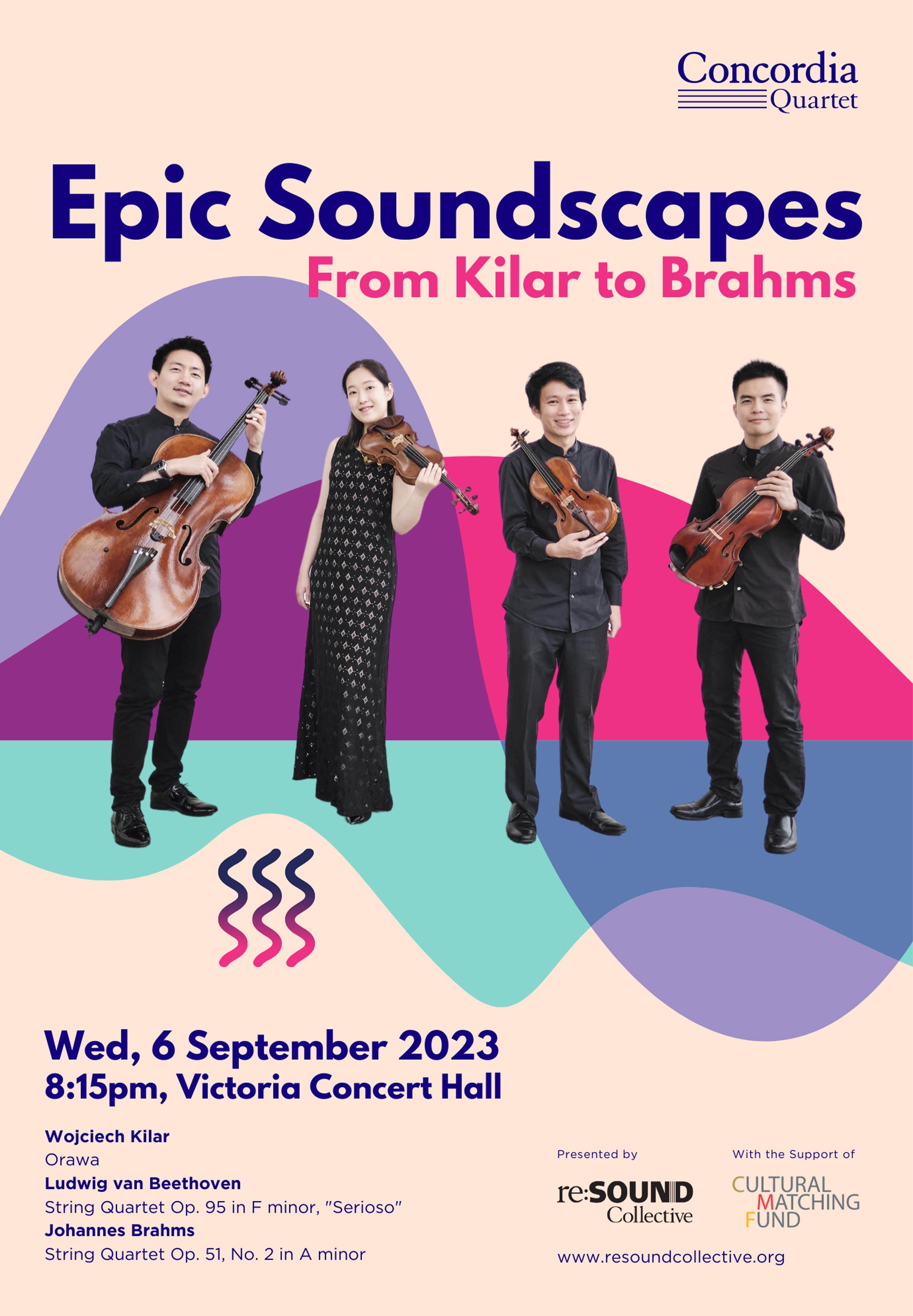
In 2015, we performed Mahler’s 8th Symphony in Paragon Shopping Centre. This sight is most surreal!! And of course the emotionally charged performance of this symphony in Esplanade Concert Hall to celebrate SG50.
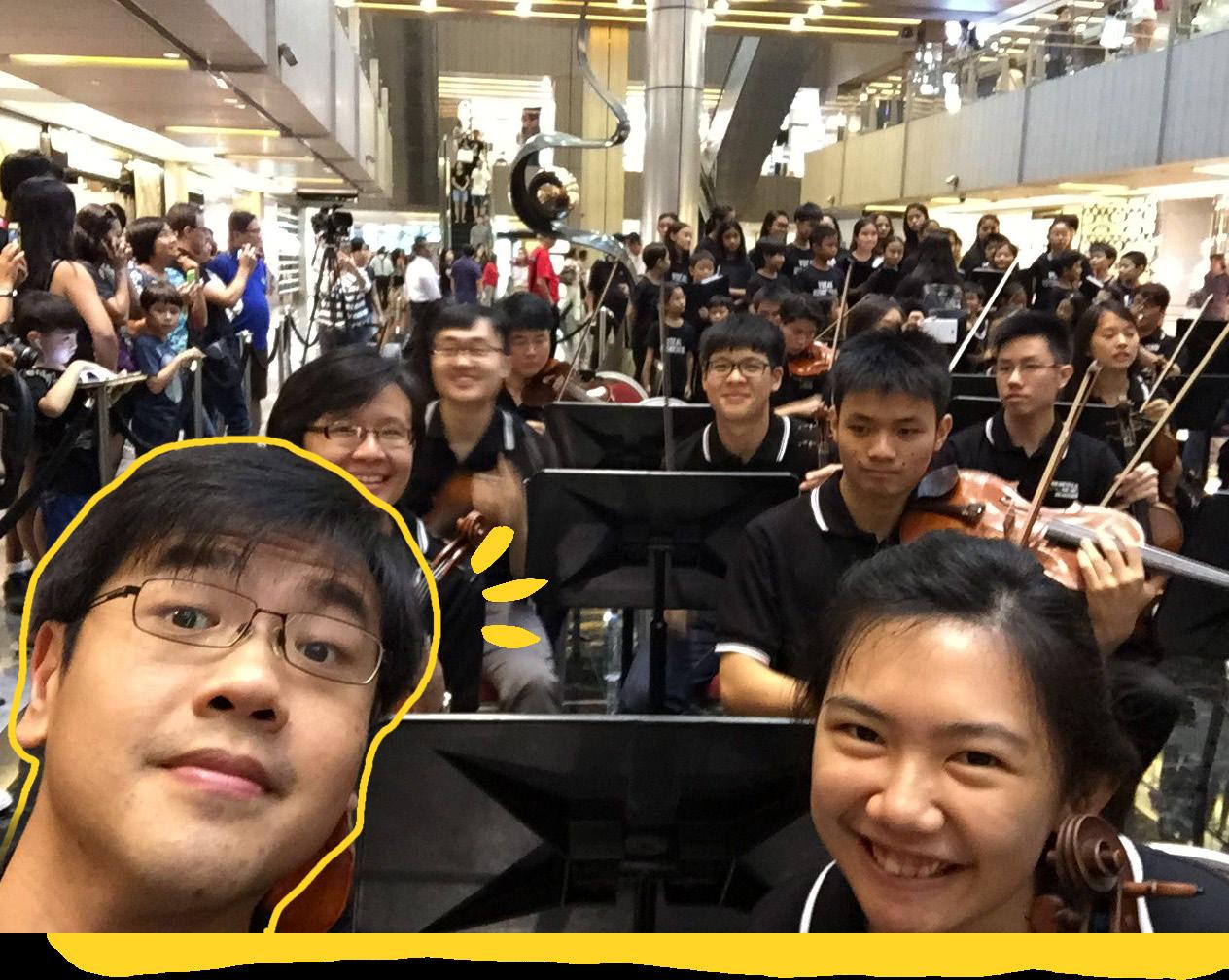
Die Walküre in 2020 was the first time that I played any Wagner opera in its entirety! It was such a blow, 4 hours of music with a double intermission! Plus, this was the last concert I did before the pandemic hit.

I like this article from the Straits Times on 28 June 2010 as the headline and content captures the essence of OMM well.
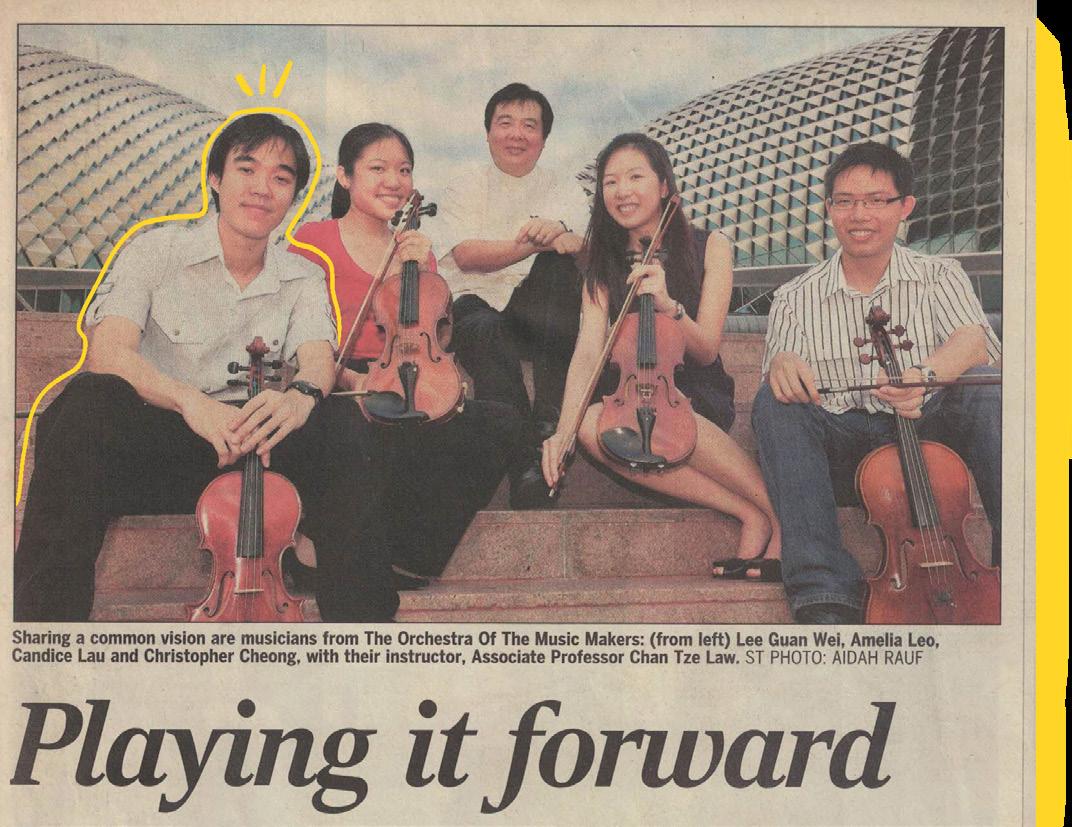
Music is a gift to be shared, and OMM believes it should be used for the wider good, be it fundraising concerts, arts education or community outreach.
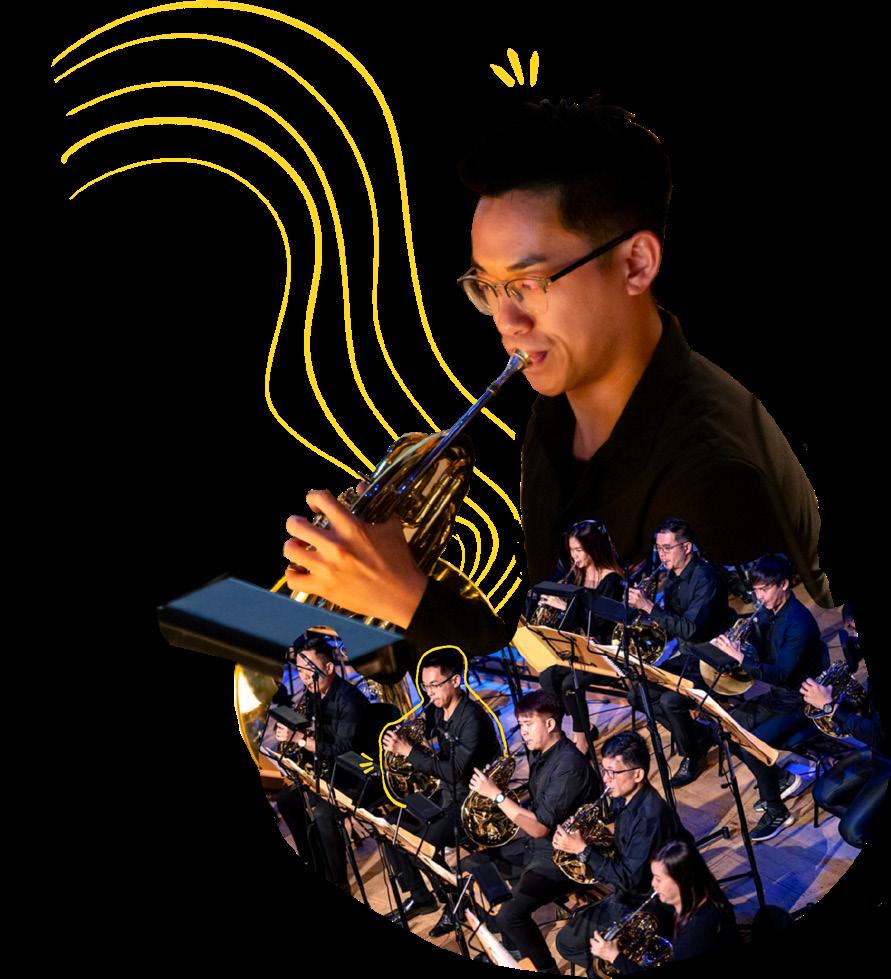

We have also been trying to push boundaries for the arts in Singapore and attempt to make the massive dreams of our musicians come true. Back then it was Mahler’s 2nd Symphony, which was our first large scale choral symphony project. These outsized dreams still continue! We have gone on to present Mahler’s 8th Symphony for SG50, and we are also premiering Wagner’s Das Rheingold in Singapore this year as part of our 15th anniversary season.
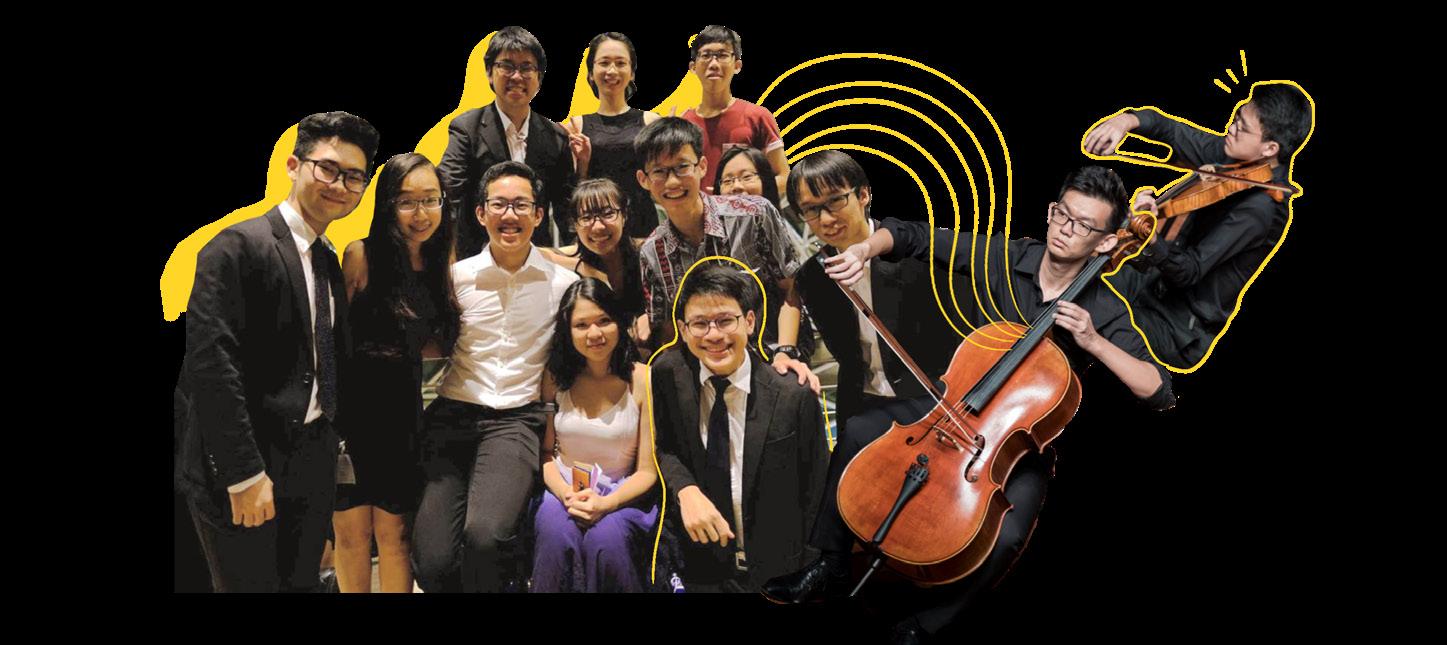 CHAN YOONG HAN
LEE GUAN WEI
CHAN YOONG HAN
LEE GUAN WEI
Our musicians share about their most memorable experiences with OMM!

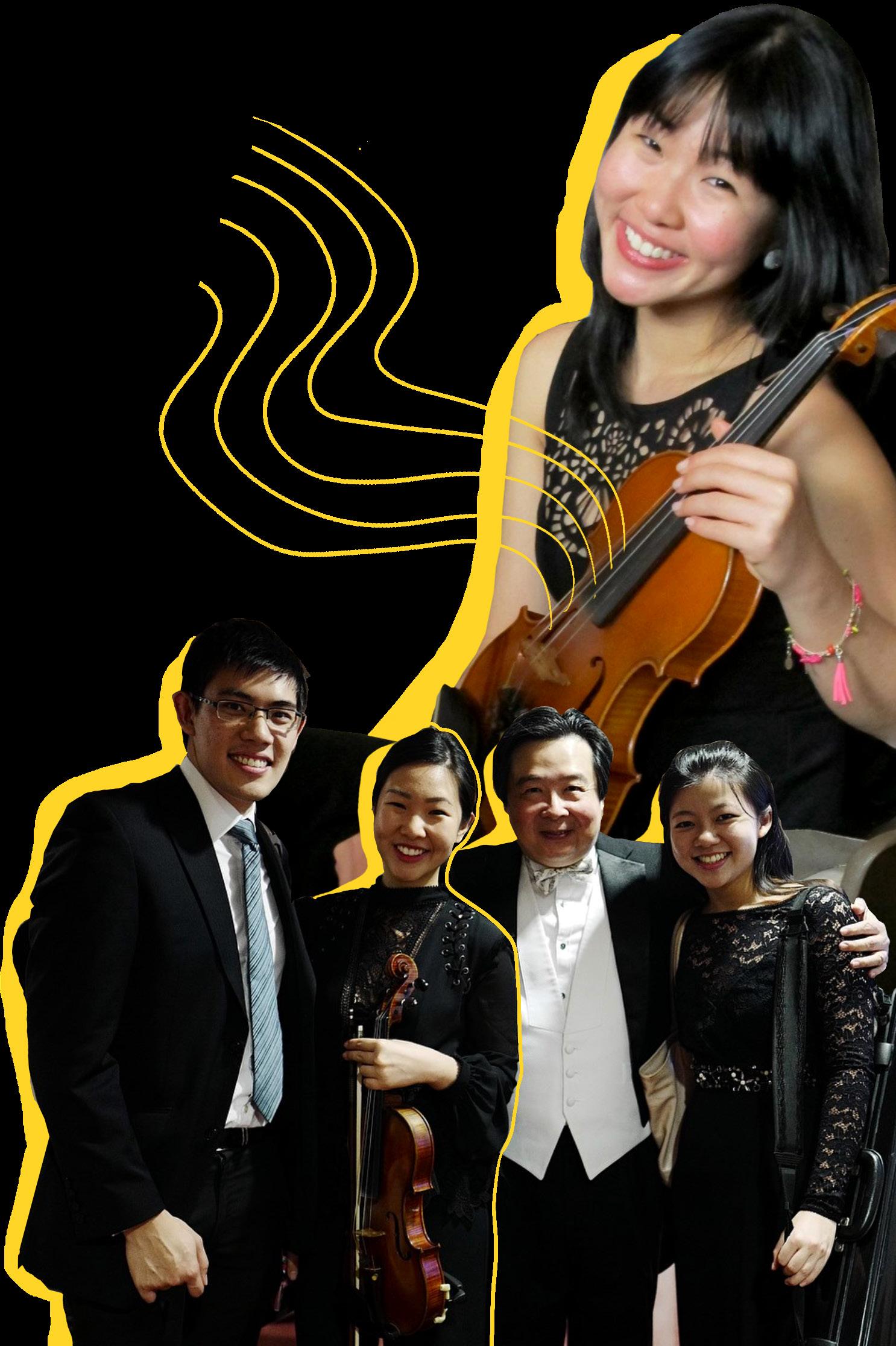
Happy 15th Anniversary OMM! How far this orchestra has come from its early days.There have been lots of special memories, from going on tour to the UK in 2013, prevailing through COVID, to accompanying the legendary Martha Argerich last year!

A big thank you to OMM for being an opening for non-professional musicians to continue sharing their love for music and exploring repertoire we perhaps would never have had the chance of playing. Here’s to continued growth and reaching new heights!

 NATALIE TAN
NATALIE TAN
The OMM-SOTA Orchestra Camp in 2016 was my first time in the camp committee and it was really challenging yet rewarding to be able to organise the camp especially since I had been a participant before.
This year was the first time that the Orchestra Camp performed 2 concerts, one in the Esplanade together with the Western Australian Youth Orchestra (WAYO). The repertoire was also varied and highly engaging, with music featured in movies, games and musicals, alongside the usual classical music repertoire.
After this camp, I went on to join the OMM Committee with various other projects, but till this day the 2016 camp still remains the most memorable for me.
JOSHUA YONG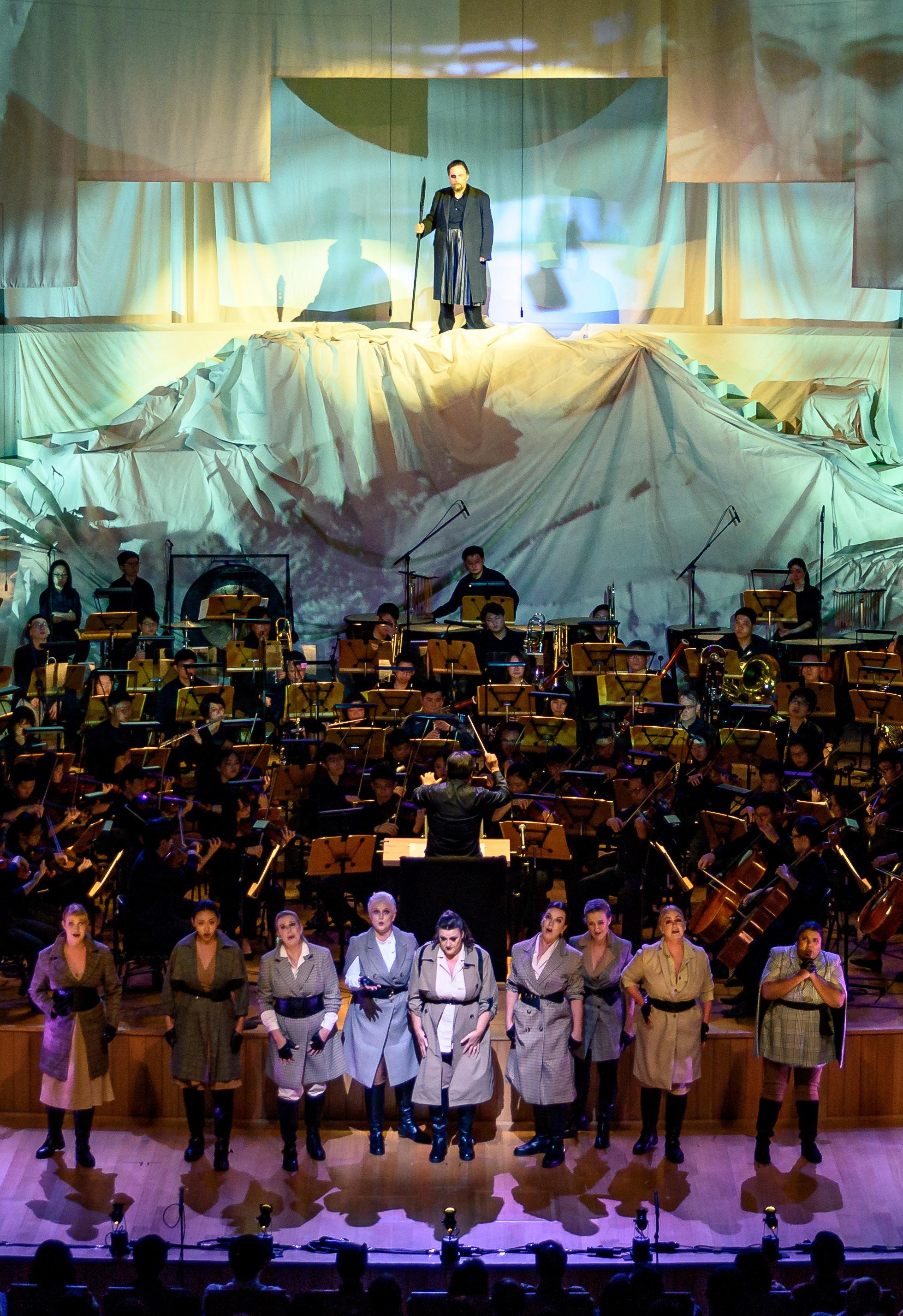 The Singapore Premiere of Die Walküre in 2020
The Singapore Premiere of Die Walküre in 2020


Orchestra of the Music Makers Ltd. (UEN: 201002361G) is an Institution of a Public Character (IPC) and donations are eligible for 2.5 times tax deduction.
Please spare 30 seconds of your time to complete this post-concert survey for us! This will help us improve on the quality of our future programmes.

